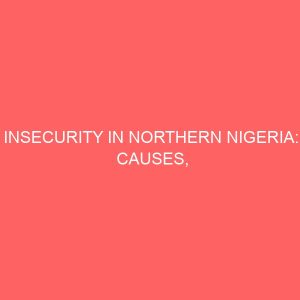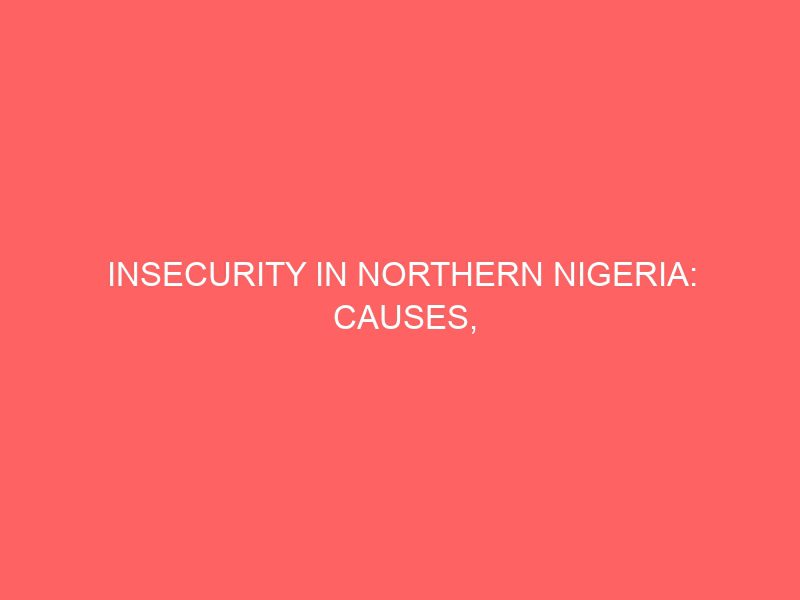Description
CHAPTER ONE
1.0 INTRODUCTION
1.1 BACKGROUND OF THE STUDY
This research is on Insecurity in northern Nigeria: causes, consequences and resolutions. Nigeria is a West African country with more than 250 ethnic groups and with an estimated population of about 170,123,740, according to the 2006 census (Akinjide 2013). It is by far the most populated country in the whole of Africa. Although Nigeria’s GDP per capita has been increased through the course of time in nominal US dollar terms, many Nigerians, unfortunately, are still living in abject poverty in spite of huge amount of human and material resources. The average income per capita does not give the real picture due to the high income inequality in the country. However, since Nigeria got her independence from Britain in 1960, the country’s political structural arrangement has been under one central government. This was to maintain some degree of independence and interdependence and as well as create supremacy authority centrally while component states retain a considerable amount of semi autonomy.
Consequently, under this arrangement, the level of interaction between individual ethnic groups, cultures, traditions, religions from different backgrounds was not easy thereby translated into ethnic and political misunderstanding, mistrust, dominations, conflicts and crises as one may not be considerate with one another. As a result, there are fear, suspicions, intolerance, grieves and greed domination among most communities in the country and especially in the North which has so many ethnic minorities.
Furthermore, it also created fear of not getting ones fair share of scarce commodities (Daily Times, 1984). However, in an attempt to bring this over 250 groups of people under Federal state system, it created more problems than solving due to fear of deprivation
The North occupies about 70% of the land mass of the country; it also has the highest infant and maternal mortality rates in the country (World Bank 2001). Similarly, it has the lowest rate of child enrolment in schools, highest number of unemployed young people in the country, highest levels of poverty as compared to the other parts of the country. Consequently, the region is faced with challenges of security of lives and property and has remained a major issue today. These problems include inter-ethic and inter-religious conflict, insurgency and terrorism such as the Boko-Haram among others. According to Temple, (2013), the indices that measure human development are by far poorer in the 19 northern states of Nigeria compared with the rest of the country ranging from the girl-child education to the Almajiri system, from women empowerment to the economic viability of states, from an immediate marshal plan like attempt at addressing the areas in conflict to how to create cooperation between states and groups. He further concluded that as a result of the above, the region was faced with the worst security challenges since independence.
Similarly, other security challenges facing the region include armed robbery and kidnapping, apart from insurgency and terrorism that have spread across the region like a wild fire across the polity, which seriously needs to be given adequate attention by the Government at all levels as pointed out by Salawu (2010). Kidnapping is still young in the north, but is fast developing and penetrating almost every area in the region. Kidnapping means taking a person away against the persons will, usually for the purpose of ransom. Today, people are getting kidnapped almost on a daily basis across the region, through so many criminal and terrorist activities (Innocent, 2012).
The situation has become so bad that needs not only the attention of joint federal-states government cooperation but also the international community; just the same way attention is being given to the Ukraine versus Russian conflicts, Syria, Iraq, Lebanon versus Hezbollah conflict, Israeli versus Palestinian conflicts, Libya, Egypt, Yemen etc. It is against this backdrop that today, the streets and most areas in different parts of the North and North-east in particular are no longer safe for honest and hardworking for the fear of being killed due to insurgency or terrorist act. Consequently, no part of the North and the Federal Capital of Nigeria Abuja is immune from this insecurity.
While every northerner and governments at all levels are concerned about insurgency and terrorism activities like Boko-Haram, ethnic, religious and tribal leaders are also seeking for solutions to end them. Unfortunately efforts were not put or channel to address the root causes of the problem. Example, when the issue of kidnapping started in the Niger Delta areas by the Militants, an average Niger Delta man would believe that it was about resource control. In the word of Joseph (2012) initially, it was the kidnap of expatriates and majority of the other Nigerians and northerners in particular believed that it was a southern affair. Until recently, when the issue of kidnapping became commercialized and was not limited to Niger Delta or Southerners but rather gradually got commercialized and has become a lucrative ventures and luring young people and gradually spread across northern Nigeria. Consequently, kidnapping business has changed from being in predominantly in the Niger Delta to the North as well. Such kidnap victims includes parents, grandparents, students etc
The central pillars of Nigerian national security was the safeguarding of the Nigerian sovereignty, independence and territorial integrity of the State as contained in the 1979 constitution. However, while the state remains nominally a sovereign and fulfils a modicum of the functions of a sovereign government, the central government has become so weak and ineffective and lacks the ability to provide simple basic public and social services. In view of the above, the Nigerian government, in 2013, due to lack of control over much of its territory, led to the seizure of some parts of Adamawa, Borno and Yobe states by the Boko-Haram. According to the former Inspector-General of Police, Hafiz Ringim:
The National Security could be regarded as the measures, facilities and systems put in place by a nation to secure its citizens and resources from danger and the risk of infiltration, sabotage, subversion or theft etc.
While according to a group of civil society organizations, the term national security implies the absence of threat to life, property and socio-economic well being of the people. They further stated that: This is contained in line of the Nigerian constitution Section 14(2) (b) of the 1999 Constitution which states that;
the security and welfare of the people shall be the primary purpose of any government; and the participation by the people in their government shall be ensured in accordance with the provisions of this Constitution.
However, in spite of the constitutional provisions which call for the respect to the economic well being of the people, the Constitution has also imposed a duty on the State to guarantee the maximum welfare, freedom and happiness of every citizen on the basis of social justice, and equality of status and opportunity. To this effect, the State shall direct its policies towards ensuring that unfortunately, the material resources of the nation are not harnessed and distributed as best as possible to serve the common good and that the economic system is not operated in such manner as to permit the concentration of wealth or the means of production and exchange in the hands of few individuals or of a group.
Statement of the Problem
According to Omoyibo and Akpomera (2013), security is a concept that is prior to the state, and the state exists in order to provide that concept. While to Thomas (1996) security is the prime responsibility of the state. The State of insecurity in Nigeria is becoming worrisome and disturbing considering the high rate of killings, bombing, kidnapping, conflicts, wars, and clashes etc. which innocent people fall to the guns of criminals in the country today. In the past recent months, no week passes without report of unknown gunmen taking human lives in the streets of northern Nigeria and north-east in particular.
The question is what are the root causes of all these killings? What are the consequences as well as solutions to this? These rhetorical questions may not need answers but it is mind-boggling that despite huge amount of naira voted every year in the name of security by the Government yet Nigeria security situation still remains uncontained. Although whenever there’s a problem there’s always the cause but the case becomes a bigger problem when the cause is not just one or two but an accumulation of national problems. What are the remote and immediate causes of insecurity in Nigerian and how can the situation be resolved? Bad leadership, corruption, illiteracy and many more are all responsible for the state of the country. The leadership of the country has contributed so much to the insecurity Nigeria is facing today.
Consequently, the displaced persons, especially in the north-east and north central where there was high level of ethno/ state of insecurity in the country, has brought about so many negative effects, including millions of internally political crises. This has led to political, social and economic disruptions which in turn lead to slow economic, social, religious and political development. The world now sees Nigeria as a very violent nation and this has destroyed the reputation of Nigerians across the world. There is no doubt that a lot of measures need to be put in place to resolve insecurity in the country. New security policies, thinking and strategies need to be developed; corruption has to be stopped by all means; the government and the people need to develop trust and work together to resolve the insecurity situation for Nigeria to move forward. Insecurity in the country is no longer talked about as a thing that occurs at night. Now, even in broad day light, crimes are committed, killings are perpetrated. Most killings are done in broad day light with the assailants proving difficult to be found. The entire scenario has become a game of shooting at each other without missing. If nothing is done to bring the life threatening situation in the country under control, it will give room to anarchy.In the light of the above which this paper attempt to address.
Conceptual Framework for Analysis
Security could be defined as the relative freedom which individuals, groups and nations enjoy from danger, risk, or threat of harm, injury, or loss to personnel and/or property. The cause, whether deliberately or by accident or for the state of being certain, adverse effects by some agent under defined conditions. It is also seen as the degree of resistance to, or protection from, harm and it applies to any vulnerable and valuable asset, such as a person, dwelling, community, nation, or organization. According to the Institute for Security and Open Methodologies (ISECOM) in the OSSTMM 3, security provides “a form of protection where a separation is created between the assets and the threat.” These separations are generically called controls, and sometimes include changes to the asset or the threat. However, if whatever went contrary to the above, this shows that there was insecurity.
Since Boko-Haram insurgency and other terrorist acts took over some parts of Nigeria, particularly the north-east, it gained international attention & recognition and become a major national menace more especially after the kidnapping of Chibok girls from their schools in Borno state. Others include the killings and slaughtering of students in their dormitories in Buni-Yadi and Potiskum all InYobe State and later the kidnapping and abduction of other women and children from their homes and communities. Due to these criminalities and terrorist activities, so many local government areas in Adamawa, Borno and Yobe lost to the Boko-Haram and remained under their control for almost two years from 2013-early to second quarter of 2015.
The question is why is there so much insecurity in our societies today? What are their causes, solutions etc? In an attempt to answer these questions, the researcher used frustration-aggression theory to explain the causes of insecurity in Nigeria. Frustration is the condition which exists when a goal-response suffers interference such as unemployment, poverty, corruption, weak judiciary system etc. While aggression could be regarded as an act whose goal-response is injury to an organism the theory believed that social movements occur for example the formation of ethnic militias in the country to fight the federal, state and local government due to their failures to oblige the social contract obligation. As a result, their frustration leads to collective and more often than not lead to aggressive behavior. Frustration has a variety of sources and can take two forms. First, it can be absolute, which happens when people do not have enough to survive, and second, it can be relative, which happen when people have enough to survive but have less than those around them. This explained the true situation of the Nigerian society today. The gap between those who have and have not are getting wide and wider day by day.
This hypothesis or theory of aggression was propounded by John Dollard, Neal E. Miller et al. in 1939, and further developed by Leonard Berkowitz in 1969. The theory says that aggression is the result of blocking, or frustrating, when a person’s efforts to attain a goal failed to achieve the said objective, it causes violence. The researcher adopted this frustration-aggression theory to explain the causes of violence and insecurity. This became apparent when the source of the frustration cannot be challenged, the aggression gets displaced onto innocent targets as currently is being done by the Boko-Haram sect. However, while violence and other related terrorist activities are condemnable in any society and must be fought at all cost, government must address these causes of insecurity or else whatever the success achieved, it is going to be mirage.







